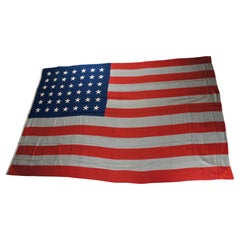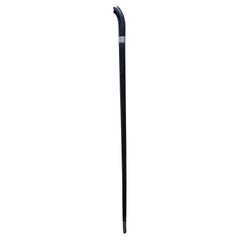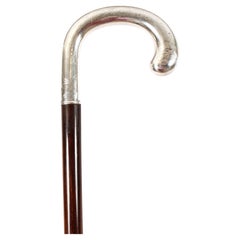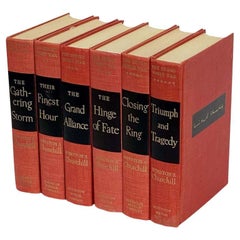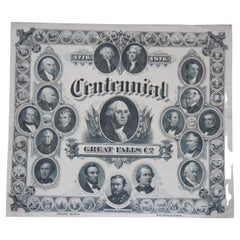19th Century Political and Patriotic Memorabilia
2
to
2
2
2
2
10
2
1
1
2
5
2
1
1
1
1
1
1
1
1
1
Style: Neoclassical
Period: 19th Century
Rare Monumental 1890 Antique 42 Star United States of America Flag
Located in Dayton, OH
Monumental fifteen foot 42 star American flag, circa 1889-1890.
The 42-star flag is rare because only a limited number of 42-star flags were produced after Washington became a state on Nov. 11, 1889.
But it takes a more intimate knowledge of flag trivia to know just why it happened this way.
White stars are added to the blue field of the star-spangled banner on the Fourth of July after a state is admitted to the union. In the fall of 1889, several western territories became states.
Dakota was admitted, and then split into North and South Dakota, on Nov. 2, 1889, which made them state and star numbers 39 and 40. Montana was named the 41st state on Nov. 8, followed by Washington, on Nov. 11.
Only a few flag manufacturers began producing 42-star flags before the official addition of the 42nd star on July 4, 1890.
Those who tried to jump the gun by being the first to produce an up-to-date flag were surprised when Idaho was admitted to the United States on July 3...
Category
American Classical Antique 19th Century Political and Patriotic Memorabilia
Materials
Cotton
Historic Antique Civil War Walking Stick Cane of General Joe Hooker
Located in Dayton, OH
"Very rare antique 18th century wood walking stick, staff or cane once owned by General Joe Hooker. Engraved silver band reads Gen. Joe Hooker. Measure: 35".
A history of the cane is included which reads: “This cane was given to Chaplain Earnshaw by the family of General Joseph Hooker, who commanded the English Forces at the Battle of Chancellorsville (which he lost.) The shaft of the cane was made from the “poop” of the vessel of John Paul Jones. The handle was made from the horn of a buffalo that General Grant shot. General Hooker died with the cane in his hands as he walked down stairs. Two battles later which ended in Gettysburg, the Norths cause was settled. General grant was put in command.”
Province
Estate of J. Frederic Gagel, owner of multiple Thoroughbred race horses that competed in the Narragansett Special and Kentucky Derby. Their family heritage was strongly intertwined with the military having officers in battles dating back to the American Revolution.
John Paul Jones (born John Paul; July 6, 1747 – July 18, 1792) was a Scottish-American naval captain who was the United States' first well-known naval commander in the American Revolutionary War. He made many friends among U.S political elites (including John Hancock[1] and Benjamin Franklin[2]) as well as enemies (who accused him of piracy), and his actions in British waters during the Revolution earned him an international reputation that persists to this day. As such, he is sometimes referred to as the ""Father of the American Navy"" (a nickname he shares with John Barry and John Adams[3]).
Jones
Jones was born and raised in Scotland, became a sailor at the age of thirteen, and served as commander of several merchantmen. After having killed one of his mutinous crew members with a sword, he fled to the Colony of Virginia and around 1775 joined the newly founded Continental Navy in their fight against the Kingdom of Great Britain in the American Revolutionary War. He commanded U.S. Navy ships stationed in France, led one failed assault on Britain, and several attacks on British merchant ships. Left without a command in 1787, he joined the Imperial Russian Navy and obtained the rank of rear admiral.
Hooker
“Joseph Hooker (November 13, 1814 – October 31, 1879) was an American Civil War officer / general for the Union, chiefly remembered for his decisive defeat by Confederate General Robert E. Lee at the Battle of Chancellorsville in 1863.
Hooker had served in the Seminole Wars and the Mexican–American War, receiving three brevet promotions, before resigning from the Army. At the start of the Civil War, he joined the Union side as a brigadier general, distinguishing himself at Williamsburg, Antietam and Fredericksburg, after which he was given command of the Army of the Potomac...
Category
American Classical Antique 19th Century Political and Patriotic Memorabilia
Materials
Hardwood
Related Items
Antique Swedish Silver Walking Cane Stick 20th Century
Located in London, GB
A decorative Swedish silver handled walking cane with foliate engraving, a presentation inscription and impressed hallmarks and makers mark, Circa 1920 in date.
It has a very decorative silver handle with foliate ornamentation, made with great attention to detail, with a sturdy hardwood tapering shaft.
It is a lovely item and as such would be appreciated by any collector of walking sticks or canes.
Provenance:
From the estate of the late Barry Lock...
Category
Swedish Art Nouveau Vintage 19th Century Political and Patriotic Memorabilia
Materials
Silver
"The Second World War, " by Winston Churchill
Located in Austin, TX
The Second World War by Winston Churchill from Houghton-Mifflin Company, Boston.
A vintage edition of Winston Churchill's six-volume memoir, The Second World War, for which he was a...
Category
American Modern 19th Century Political and Patriotic Memorabilia
Materials
Paper
Antique Chinese Silver & Malacca Walking Stick Cane 19th Century
Located in London, GB
This is a beautiful antique Chinese gentleman's silver pommel and Malacca walking stick, circa 1880 in date.
This decorative walking cane features an exquisite Chinese silver pomme...
Category
Antique 19th Century Political and Patriotic Memorabilia
Materials
Silver
Antique Victorian Vintage Chinese Ivory Bovine Walking Stick Cane Carved Dragon
Located in Dublin, Ireland
An Exceptionally Fine Example of a Chinese Export Hand Carved Bovine Ivory Walking Stick of small proportions, last quarter of the Nineteenth Centu...
Category
British Victorian Antique 19th Century Political and Patriotic Memorabilia
Materials
Horn, Ebony
H 25.75 in W 2.75 in D 25.75 in
Antique Faceted Carnelian and Silver Banded Walking Stick Cane
Located in Miami, FL
Antique Faceted Carnelian and Silver Banded Walking Stick
Offered for sale is an antique wooden walking stick with a carved and faceted carnelian to...
Category
19th Century Political and Patriotic Memorabilia
Materials
Carnelian, Silver
Antique Walking Stick/Cane, Germany with Around 1910
Located in Berlin, DE
Antique walking stick/cane, Germany with around 1910
Antique historical condition.
Please refer to the detailed photos for the condition
(...
Category
Antique 19th Century Political and Patriotic Memorabilia
Materials
Silver
Antique Pug French Bull Dog Glove Holder Walking Stick Cane
Located in Miami, FL
Antique Pug French bull-dog glove holder walking stick cane
Offered for sale is an Antique 19th-century carved hardwood glove holder walk...
Category
English Late Victorian Antique 19th Century Political and Patriotic Memorabilia
Materials
Copper
Antique Walking Stick Cane with Carved Greyhound Handle Dated 1874s
Located in London, GB
This is a superb antique Victorian walking stick featuring a carved horn handle in the form of a greyhound featuring glass eyes on tapering malacca shaft with a decorative silver ban...
Category
Antique 19th Century Political and Patriotic Memorabilia
Materials
Silver
Antique Walking Stick Cane 9 Ct Gold Pommel, Late 19th Century
Located in London, GB
This is an exquisite antique Victorian walking cane with a 9ct gold pommel, dating from the late 19th Century.
The gold handle is round in sh...
Category
English Victorian Antique 19th Century Political and Patriotic Memorabilia
Materials
Gold
Antique Ladies Cane or Walking Stick by Wmf Germany, 1910s
Located in Esbjerg, DK
A stylish dress cane or women's walking stick. Its made from black lacquered wood and features an ornamented handle in Alpacca Silver. Fully hallmarked from...
Category
German Edwardian Vintage 19th Century Political and Patriotic Memorabilia
Materials
Silver
Antique Vintage Lady's Gentleman's Wooden Walking Stick Cane Bone Crook Handle
Located in Dublin, Ireland
Stylish Solid Polished Dark Brown Malacca Wood and Sectional Horn Crook Handle in colours Lady’s or Gentleman’s Walking Stick or Cane with Traditional ornately cast Crook shaped hand...
Category
British Victorian Antique 19th Century Political and Patriotic Memorabilia
Materials
Hardwood
H 34.5 in W 5.25 in D 5.25 in
Walking Stick / Cane, Germany with Around 1910
Located in Berlin, DE
Walking stick/cane, Germany with around 1910.
antique historical condition.
Please refer to the detailed photos for the condition.
(V-224)
Category
German 19th Century Political and Patriotic Memorabilia
Materials
Wood
Previously Available Items
Historic Antique Civil War Walking Stick Cane of General Joe Hooker
Located in Dayton, OH
"Very rare antique 18th century wood walking stick, staff or cane once owned by General Joe Hooker. Engraved silver band reads Gen. Joe Hooker. Measure: 35".
A history of the cane is included which reads: “This cane was given to Chaplain Earnshaw by the family of General Joseph Hooker, who commanded the English Forces at the Battle of Chancellorsville (which he lost.) The shaft of the cane was made from the “poop” of the vessel of John Paul Jones. The handle was made from the horn of a buffalo that General Grant shot. General Hooker died with the cane in his hands as he walked down stairs. Two battles later which ended in Gettysburg, the Norths cause was settled. General grant was put in command.”
Province
Estate of J. Frederic Gagel, owner of multiple Thoroughbred race horses that competed in the Narragansett Special and Kentucky Derby. Their family heritage was strongly intertwined with the military having officers in battles dating back to the American Revolution.
John Paul Jones (born John Paul; July 6, 1747 – July 18, 1792) was a Scottish-American naval captain who was the United States' first well-known naval commander in the American Revolutionary War. He made many friends among U.S political elites (including John Hancock[1] and Benjamin Franklin[2]) as well as enemies (who accused him of piracy), and his actions in British waters during the Revolution earned him an international reputation that persists to this day. As such, he is sometimes referred to as the ""Father of the American Navy"" (a nickname he shares with John Barry and John Adams[3]).
Jones
Jones was born and raised in Scotland, became a sailor at the age of thirteen, and served as commander of several merchantmen. After having killed one of his mutinous crew members with a sword, he fled to the Colony of Virginia and around 1775 joined the newly founded Continental Navy in their fight against the Kingdom of Great Britain in the American Revolutionary War. He commanded U.S. Navy ships stationed in France, led one failed assault on Britain, and several attacks on British merchant ships. Left without a command in 1787, he joined the Imperial Russian Navy and obtained the rank of rear admiral.
Hooker
“Joseph Hooker (November 13, 1814 – October 31, 1879) was an American Civil War officer / general for the Union, chiefly remembered for his decisive defeat by Confederate General Robert E. Lee at the Battle of Chancellorsville in 1863.
Hooker had served in the Seminole Wars and the Mexican–American War, receiving three brevet promotions, before resigning from the Army. At the start of the Civil War, he joined the Union side as a brigadier general, distinguishing himself at Williamsburg, Antietam and Fredericksburg, after which he was given command of the Army of the Potomac...
Category
American Classical Antique 19th Century Political and Patriotic Memorabilia
Materials
Hardwood
1876 Antique American Centennial Bank Note Engraving 18 Presidents 36 States
By American Bank Note Company
Located in Dayton, OH
"Rare antique 1876 bank note engraving commemorating the Centennial anniversary of the United States of America and advertising the Great Falls Company; prod...
Category
American Classical Antique 19th Century Political and Patriotic Memorabilia
Materials
Paper
H 8.375 in W 9.5 in D 0.1 in
American Civil War Era Black Metal Ballot Box by Geo Barnard & Company, 1800s
Located in Oklahoma City, OK
Black cylindrical 19th century ballot box by Geo Barnard & Company of Saint Louis Missouri. A wonderful piece of history, this State government ballot box is tall and round in form. ...
Category
American American Classical Antique 19th Century Political and Patriotic Memorabilia
Materials
Metal, Tin
19th Century George Washington Cast Iron Stove Figure
Located in Essex, MA
A striking 19th century cast iron figure of George Washington, the full-body figure composed of two joined halves with a well detailed head, body and robe details, the back inscribed in cursive, in the casting, "Design Patented Aug. 26, 1843," together with a carved and white-painted Ionic column capital.
Provenance: The Collection of Frederic and Jean Sharf
This cast iron figure of George Washington is one of the most striking of all 19th century "dumb stoves." These usually did not have a firebox, but were connected by a stovepipe to a functioning stove on a floor below. That way two rooms could be heated by one stove. The designer, Alonzo Blanchard (1799-1864), chose Washington because the country was preoccupied with the nation's first president as a symbol of unity. In this guise, Washington is shown wearing a Roman toga over 18th century clothing. Blanchard probably based his design on the 1826 marble statue of Washington by Francis Chantrey, installed in the Massachusetts State House.
(Source: The Albany Institute)
Measures: Height 47 inches
Height on column capital base...
Category
American American Classical Antique 19th Century Political and Patriotic Memorabilia
Materials
Iron
Early August Buermann Hand-Forged Carbon Steel Spurs and Original Leather Straps
By August Buermann
Located in Ottawa, Ontario
Early August Buermann hand-forged carbon steel spurs and original leather straps, circa 1880-1890, The spurs are complete and original, still retaining the spur bells, tooled leather boot covers, chain, wheel spurs, the spurs are in as found condition and have not been cleaned or restored in any way.
The spurs have the company’s brand marks “AB” inside a star together with “PAT’D” of each of the spurs. August Buermann immigrated to the US from Germany in 1864 and enlisted with the US Army. He fought in the Civil War and afterward returned to Newark, NJ which was a major manufacturing city and worked for Alexander Barclay’s company. Buermann was a great businessman and bought out Barclay and renamed the company Buermann Manufacturing Co in 1866. Over the next 60 years Buermann’s company produced the most complete catalog of bits and spurs...
Category
American American Classical Antique 19th Century Political and Patriotic Memorabilia
Materials
Steel
H 3 in W 10 in D 4.5 in
